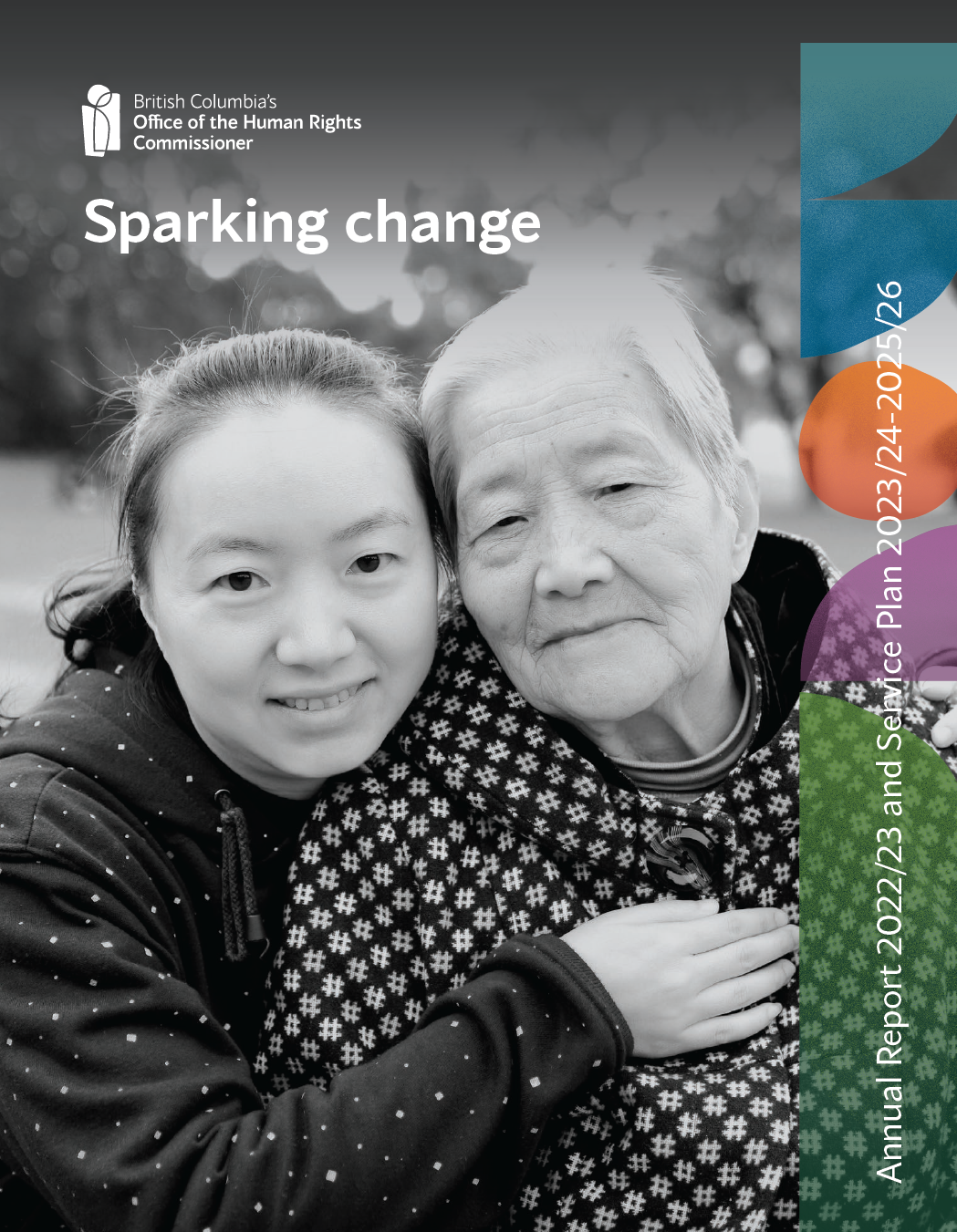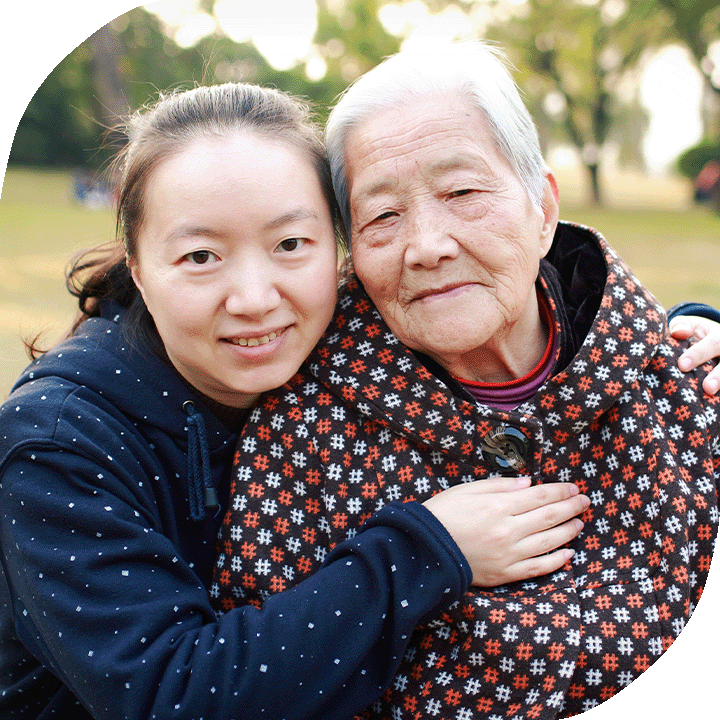
A key accountability mechanism for our work is the Commissioner’s yearly budget, service plan and annual report submission and presentation to the all-party Select Standing Committee on Finance and Government Services of the Legislative Assembly of B.C.
A three-year Service Plan (2023/24–2025/26) flows from our Strategic Plan and outlines the objectives and activities we envision undertaking in each of our priority areas in order to fulfill the Commissioner’s mandate.
Our Annual Report (2022/2023) tells the story of our work and outcomes resulting from the previous fiscal year. As we grow as an organization, we plan to use our annual reports as an opportunity to highlight the impact our work is having on human rights, balancing numbers with stories and context to ensure a human rights-based approach to evaluation. We will ask people in British Columbia to work with us to tell our story of change.
For desktop viewers, we recommend setting your pdf reader to two-page view.
*If the version available via this page is not accessible for you, please feel welcome to contact our Office to request a printed copy or another format that meets your needs.
More resources
Executive summary
In 2022/23, BC’s Office of the Human Rights Commissioner (BCOHRC) focused on sustaining our established policies, practices, programs and activities and increasing our impact. This was our Office’s fourth year of start-up and of our five-year strategic plan; in 2024/25, we will evaluate our impact and renew our planning process for the next five-year period of our development.
Strategic priority highlights
Our Strategic Plan 2020/21-2024/25 describes five program-related priorities: discrimination under B.C.’s Human Rights Code, decolonization, hate and the rise of white supremacy, poverty as a cause and effect of inequality and injustice and human rights protections for those being detained by the state. The following are highlights from our 2022/23 work in these key areas.
Discrimination
B.C.’s Human Rights Code guarantees us all rights and protects us from discrimination based on several characteristics, including gender, race, Indigeneity and disability. In support of these rights and protections, in 2023/23 we:
- launched the Rewrite the Rules campaign challenging ableism in our communities
- engaged in community embedded research in Chetwynd, Cranbrook, Terrace and Chilliwack as part of our Baseline Project
- launched the second video in our Human Rights in B.C. series, outlining the three parts of B.C.’s human rights system
- delivered a series of workshops on rights and responsibilities under the Human Rights Code
See page 14 of the full annual report for further details about our work on discrimination under B.C.’s Human Rights Code.
Decolonization
Our Office is committed to supporting self-determination of Nations by listening deeply to Indigenous Peoples and working to change and improve structures that impede their full, equal and just participation in economic, social, cultural and political life. In 2022/23, Commissioner Govender:
- applied to intervene in two cases involving the Province’s duty to consult First Nations before granting mineral tenures on their traditional territories, which consider the legal effect of the Declaration on the Rights of Indigenous People Act
- met with leaders from six Indigenous communities and representative organizations, bringing her closer to her goal of meeting with leaders from every First Nation in B.C.
- provided guidance to the B.C. government in its processes to implement the Anti-Racism Data Act, including through the Commissioner’s meeting and presentation to the anti-racism data committee
- spoke at the United Nation’s Expert Mechanism on the Rights of Indigenous Peoples seminar on establishing effective monitoring for the implementation of the UN Declaration on the Rights of Indigenous Peoples
See page 18 of the full annual report for further details about our work on decolonization.
Hate
Combating hate in all its forms—from hateful speech to hateful violence—requires addressing fear and ignorance through a variety of mechanisms for social change. In 2022/23, we:
- released the findings and recommendations of the Inquiry into hate in the pandemic, the only independent inquiry of its kind in the world
- presented to the Senate Standing Committee on Human Rights about the prevalence of Islamophobia in Canada
- concluded a yearlong partnership with the BC Association of Broadcasters to launch a province wide anti-hate campaign for tv, radio and print called Never Accept Hate (#NAH)
See page 24 of the full annual report for further details about our work on hate and the rise of white supremacy.
Poverty
Our Office is committed to working towards effective and meaningful domestic protections for economic rights, engaging with poverty as a human rights issue and dismantling discrimination against people living in poverty. In 2022/23, we:
- launched our ‘Employment equity toolkit’ featuring six brand new resources to support employers and organizations in removing barriers for groups that are often treated unfairly due to personal characteristics
- successfully intervened in Gibraltar Mines Ltd. v. Harvey at the B.C. Supreme Court, resulting in a ruling that affirms broader protections for parents and caregivers in the workplace
- spoke out and advocated directly with municipalities and the province of B.C. to fight for rights of unhoused people living in encampments
- continued our work to see social condition added as a protected ground to B.C.’s Human Rights Code
See page 30 of the full annual report for further details about our work on poverty as a cause and effect of inequality and injustice.
Detention
We all have the right to be free from arbitrary detention, abuse of power and other unfair treatment if we are detained by the police, in correctional centres, under community supervision or in mental health systems. In 2022/23, Commissioner Govender:
- participated in a successful campaign led by human rights organizations from across the country to end the detention of migrants in B.C.’s provincial jails
- agreed to audit the implementation of a settlement agreement between the Vancouver Police Board and a Heiltsuk grandfather and granddaughter who were wrongly handcuffed and accused of fraud
- met with Vancouver City Councilors, school board trustees and park board commissioners and many others to explain the recommendations on policing contained in our ‘Equity is Safer’ report
See page 34 of the full annual report for further details about our work on human rights protections for those being detained by the state.
Highlights of our 2022/23 impact
To measure the impact of our work and its consequences for human rights across B.C., BCOHRC has developed an evaluation and impact framework centered on five concepts: building respectful and accountable relationships, creating accessible and relevant public education materials, providing recommendations to decision-makers on ways to improve systemic human rights issues, developing legal arguments to influence case law and building human rights-based policies, practices and culture.
Respectful relationships
The quality of our relationships will tell the story of our impact. In 2022/23, BCOHRC engaged with more than 2,200 calls and emails from members of the public, met with and hosted 19 events for over 500 people, reached more than 3,000 people through the Commissioner’s external speaking engagements, and conducted significant community and Indigenous engagement work across the province (see page 41 for more details).
Public education
BCOHRC uses a wide variety of educational content to reach our audiences with the right information in order to influence attitudinal and behavioural change. In 2022/23, we launched 10 new educational products, including through our public legal education initiative and ‘I love my human rights’ video series (see page 46 for more details).
Recommendations to decision makers
BCOHRC provides guidance and recommendations to duty bearers—including elected officials and government leaders, as well as employers, landlords and service providers—to help prevent and eliminate systemic disadvantages and discrimination. In 2022/23 we engaged in 329 external meetings, including 209 meetings with government bodies like municipalities and policing agencies, and 88 meetings with non-profit groups and community partners (see page 51 for more details).
Legal arguments
BCOHRC aims to improve human rights laws and systems in B.C. by holding public legal inquiries and intervening in court cases that may have a systemic impact on human rights. In 2022/23, BCOHRC intervened in three court cases: Gibraltar Mines v. Harvey, Neufeld v. British Columbia Teachers’ Federation (BCTF) on behalf of Chilliwack Teachers’ Association and Gitxaala Nation v. Chief Gold Commissioner of B.C. et. al. and Ehattesaht v. His Majesty the King in right of B.C. et al. (see page 53 for more details).
Human rights-based policies, practices and culture
Across all of our operations, we strive to embody human rights values and our organizational guiding principles in our policies (what we say), practices (what we do) and culture (who we are). In 2022/23 we completed work on a policy and practices framework which acts as an umbrella to all BCOHRC internal policies, ensuring they are grounded in a human rights-based and decolonizing approach. New working groups were also created to ensure we meet our responsibilities under the BC Accessibility Act and that we are acting on staff needs and priorities identified through our Workplace Environment Survey (see page 55 for more details).
Looking ahead: 2023/24–2025/26 service plan
Our service plan (2021/22–2023/24) flows from the above-mentioned strategic priorities and evaluation plan. It outlines the objectives, key performance indicators and a sample of the activities we envision undertaking over a three-year period to fulfil the Office’s mandate and to establish a baseline for setting future targets.
Some of our activities in the service plan period include:
- developing a unified web portal for easier access to the human rights system in B.C. in collaboration with the BC Human Rights Tribunal and BC Human Rights Clinic
- publishing a searchable database of recent human rights-related recommendations from public and non-profit bodies to facilitate further public advocacy and research
- monitoring and advocating for the implementation of recommendations in BCOHRC’s public inquiry into hate during the pandemic; launching BCOHRC’s future inquiries
- submitting applications for leave to intervene in additional cases, as capacity permits
- continuing to assess, monitor and improve on equity, diversity and inclusion in our recruitment practices
See page 57 of the full annual report for detailed tables of current and planned activities.
Budget and expenditures 2022/23
The 2022/23 operating budget for BC’s Office of the Human Rights Commissioner was $6.809 million and the capital budget was $35,000. Actual operating expenditure was $6.770 million, returning approximately $0.039 million to general revenue.
Going forward, in the period covered by our service plan, we have been approved an operating budget of $7.505 million in 2023/24, $7.608 million in 2024/25 and $7.608 million in 2024/25 and a capital budget of $35,000 per year.
For more about how we built our organization and made an impact in 2022/23—and on what we are planning in the years ahead as we grow, refine and sustain our Office—please see our full annual report, Sparking Change.
